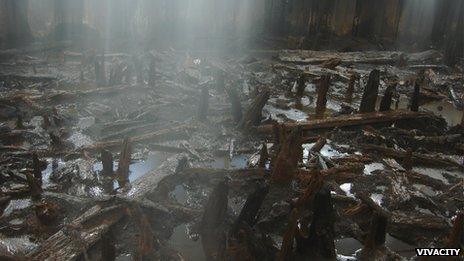Flag Fen archaeology idea brings in public to dig deep
- Published

The exposed "causeway" must be watered constantly in order to preserve it
Renowned Bronze Age archaeological site Flag Fen in Cambridgeshire will host a first-of-its-kind dig that makes the public integral to the project.
The idea combines both "crowdfunding" and "crowdsourcing"; for contributions starting at £125, donors can get their hands very dirty and dig for a day.
The venture's website will also stream live video from the dig as well as host lectures and interviews with experts.
The aim is to fully explore the site before it dries out and is destroyed.
Flag Fen was discovered in 1982 by archaeologist Francis Pryor, who uncovered part of a one mile (1.6km) causeway across the Fenland marshes in Cambridgeshire.
The site lies largely underground, preserved for 3,000 years beneath a layer of peat that keeps artefacts from decaying.

An exposed part of the site, called the preservation hall, shows some of the thousands of timbers that make up the site poking up through the ground, and these are regularly watered to stave off decay.
"It's the only place in Europe where you can see this kind of archaeology exposed," said Lisa Westcott Wilkins, managing director ofDigventures, external, the firm behind the new project.
Beneath, the peat will have preserved not just the wood artefacts such as leather and other organic material, which at other Bronze Age sites will have long since been consumed.
"The reason Flag Fen doesn't have the sort of public profile of Stonehenge is that there aren't all these huge stones everywhere people can see - the entire site rests on top of very sensitive archaeology," she told BBC News.
But the water that has kept Flag Fen preserved until now is seeping away, due in part to climate change but largely to active drainage and the sprawl of neighbouring Peterborough, which nearly reaches the borders of the site.
.jpg)
The watery fenland that has preserved the site until now is being drained away
So the team at Digventures chose Flag Fen as its flagship site to try a new kind of archaeology, against a difficult global economic climate.
"Most of the archaeology outside of universities happens in advance of infrastructure or building, so when the market for that slows down, we don't get to dig very much," explained Mrs Wilkins.
"We've been thinking for a long time that things need to change, that there's not the kind of outreach that we feel really could be happening. There are lots of good people who are held back by the traditional way of doing things."
The crowdsourced dig will take place between 23 July and 12 August.
For those who cannot visit the site in person, the project aims to solicit contributions starting from £10 to gain access to a wealth of resources on its website - including features such as "find of the day" and interviews with "super-star archaeologists".
But Mrs Wilkins said combining this crowdfunding with the crowdsourcing of archaeologists of all stripes made the project unique, and held the potential to truly bring the public into an otherwise rarefied academic world.
"This is for people who have always wanted to try it but are not sure they're going to like it, not sure they want to commit to a week, but who also don't want to just turn up and look at stuff.
"This will put you in a hole, on-site."
- Published2 July 2011